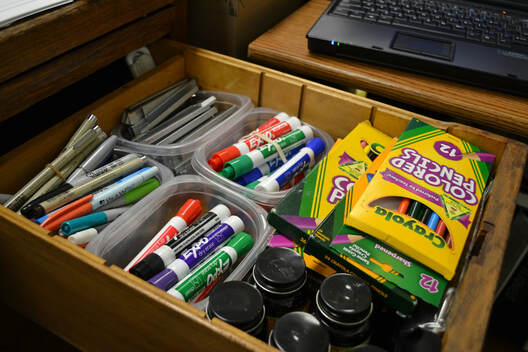|
9/20/2019  Are you thinking of becoming a teacher? You’ll need to jump through many hoops before you’ll be able to teach in a public school. Besides college programs and student-teaching, there are licensing exams, fingerprinting, training about recognizing child abuse/neglect, and, depending on the state, other requirements. It will be a long, arduous process. Even after having satisfied the formidable mountain of requirements, nearly 50 percent of new teachers leave the profession within their first five years. That is why this list was compiled! Take time to ask yourself these questions to help figure out if you want to work in public education for the long term. Unlike the average person, who spends five or less years in every job, teachers who remain in the profession currently, have worked in it for about 14 years. Whether you’re a twenty-something looking for your first job or a mid-lifer thinking of switching careers, there are aspects of working in public education that you should be aware of before you spend countless hours and thousands of dollars preparing. To know if working in public education is for you, ask yourself these questions:  1-What are your personality characteristics? Many aspects of teaching style are functions of personality. Individuals with a more easy-going attitude, for example, will likely be more flexible about classroom rules and procedures than someone who is highly efficient and organized. Someone who is more reserved would probably be more sensitive to classroom noise level than another, more outgoing person. The manner in which you were parented also bears on how you will manage students in your classroom. Depending on whether a teacher perceives their parents as having been more authoritarian, authoritative, or permissive, and how well that system worked for them, will be reflected in their dealings with students in their classroom. Each of these parenting styles impacts varying developmental outcomes for young people. Before entering public education, consider how your style will manifest itself in practice. Think about any harmful parenting strategies you experienced as a child and how you can avoid repeating them in your classroom. Also examine how to put positive parenting strategies into practice in the classroom. Even if effective behavior management techniques were not learned during one’s own childhood, it is still possible to learn and practice effective strategies learned from other sources. Personality affects dealings with students, as well as dealings with colleagues, support staff, and supervisors. If you are efficient and judgemental of others’ lack of efficiency and you express annoyance that the janitor left the soap dispenser empty all week, you may make an enemy out of said janitor...and the teacher down the hall who is his cousin. There is a lot of nepotism in school districts. Everything is political and some personalities are more adept at negotiating this than others.  2-What is your gender? That’s irrelevant, right? It should be. But it isn’t. Male teachers are viewed differently by students than female teachers. Structured male teachers tend to be described as competent and authoritative whereas structured females in the same role are called rude and unapproachable. Students tend to push the limits more with female teachers in areas like missing class time, talking with their neighbors, or using their cell phones. Nevermind your gender. What is your race? What is your age? What is your height? All of these factors will impact how your students “see” you. They will respond to you, because of those things, very differently than they will respond to a different person saying the exact same words that you are saying. Everyone has their biases and students are no different. There is nothing you can do about. Just be aware of it.  3-Are you willing to make a large time commitment outside of work hours? A teacher’s day is spent nearly exclusively on student needs. Having to use the restroom, make an important phone call, or even take care of other school-related business is limited to the 3-5 minutes between class periods or after-school hours. During the school day teachers actively teach, guide, counsel, and complete countless odd tasks relating to their students. The time-slots that are not devoted to instruction (conference, supervision, lunch, and/or activity periods) are usually inadequate or otherwise undesirable to fully prepare for instruction in all classes. Grading, planning, completing administrative paperwork, organizing and managing the classroom are activities that often occur during a teacher’s “personal time” since it is nearly impossible to get everything done during a typical school day. Besides that, many teachers are either required or “voluntold” to complete professional development and/or supervise extracurricular activities. Some who are disdainful of teachers envision a panacea of early “clock-out time” and summers off. They think teaching is a “cake” job. Although the teaching profession is not typically associated with the same types of stressors found in some other jobs, such as sales quotas, tight deadlines, or mandated over-time, it is well-known that teachers can “burn-out” from pressures associated with current educational paradigms. Given the stressors that do exist in education, time management is essential for longevity in the teaching profession. Besides work, it’s also important to budget time for a life: make plans with friends and family, exercise and eat healthily. But, to proactively manage a full-course load, teachers should use some personal time to develop a structured plan for how they will run their classes. The first years of working with a particular grade or subject have the steepest learning curve because lessons need to be developed. By making organized plans for instruction and refining them yearly, teachers can lighten their load. If a teacher is scheduled to teach the same subject/grade repeatedly, the “wheel” does not need to be constantly reinvented. Having regular classroom procedures that are followed with students is also important. That will make class time more efficient and prevent behavioral disruptions. It’s better to have a plan and modify it than to come in with no plan and be underprepared. Teaching has been described as an "exploitative career" because of unrealistic expectations placed upon the public education system. Public education has changed from its earliest roots of teaching literacy and arithmetic to an expanded curriculum of content subjects in natural and social sciences, physical education, career planning, and fine arts. Schools are expected to socialize, provide drug awareness, and other health awareness services to students. School administrators hold teachers responsible for being “sensitive” to student mental health issues, homelessness, inability to communicate in english, and any other condition students come to school with which impacts their ability to appropriately participate in the classroom experience. Add to that is the fact that content area teachers’ instructional schedules can, and often are, changed yearly and by semester. A teacher who is certified to teach secondary social studies can be scheduled to teach subjects as varied as US history, global studies, geography, economics, or psychology. This is also true for teachers certified to teach biology because they are also often scheduled to teach ecology, human body systems, marine science, or agricultural science. Preparation time for teaching those varied subjects is extensive and is often done outside of work hours.  4-Are you prepared to encounter unrealistic expectations of you? Teachers are held responsible for things that are outside of their control. Students arrive to class who may be homeless, have been ineffectively parented, without having had enough to eat or sleep, who haven’t bathed, who are sick, who can’t speak the language that instruction is given in, who suffer from mental health issues, and many other conditions that are the result of things outside of the school environment. When any student is listed on a teacher’s roster, public school administrators expect that student’s teacher to find ways to teach the curriculum to that student so that the student passes the class. It makes sense that students (people) who have been traumatized by not having a reliable home environment, adequate sleep or food, parental stability, are unhealthy mentally or physically, or cannot understand the teacher’s language, must have those priorities addressed before they can reasonably be expected to function and learn in a public school classroom. Yet, this is not acknowledged in today’s public education paradigm. Schools are charged with “bridging the gap” between marginalized populations (such as English Language Learners (ELLs) or other minority groups who disproportionately exhibit a lack of school readiness) and this manifests in teachers being pressured to “pass” students who have not (or may not be able to) complete the coursework. Even students with poor attendance (for whatever reason) are “graduated” because teachers “work with them” to pass their class. Building principals urge teachers to “make contracts” for “credit recovery” with students who fail. High absenteeism, what used to be called truancy, is a problem addressed by family courts. But in schools, teachers have been told to “make their lessons more engaging so attendance and behavior improve.'' The absurdity of holding a teaching professional responsible for the unfortunate circumstances or the intentional choices of their students is so common these days, most new teachers don’t even bat an eye when these sorts of proclamations are made by administration. Schools are passing this pressure on to teachers because they, too, are under pressure to increase their graduation rates or risk governmental sanctions. Graduating students who have not actually achieved necessary skills deludes them into believing that rewards don't need to be earned, Aside from the disservice being done to all students in devaluing a high school diploma, this practice does not model how the real world will treat them in life.  5-Can you deal with getting little respect? Many students behave in a respectful manner because that is just who they are and it is how they were taught. There are exceptions! By following through with what you tell students, you can teach them that you say what you mean and mean what you say. Once the more “difficult customers” learn that about you, you may have taught them to follow your directions. There will always be some students who have not learned to behave in a respectful manner and you may never get them to comply with simple common courtesies. Adults you encounter will have opinions about teaching. They may revere you, pity you, or both! Some may say that they couldn't do a teacher’s job. Yet others may be overheard complaining loudly about teachers or teacher salaries. Some people may share horror stories about their child's education. Bottom line: teaching is not a high status job.  6-How important is Salary? Public school teaching salaries vary based on geographic area. If you are thinking about a teaching career, consider salary alongside factors such as the percentage of new teachers who are expected to qualify for a pension in your state, class sizes (which impact both learning and teaching), and other working conditions such as administrative support and instructional resources. Teachers often supplement inadequate instructional resources provided by their districts. Personal funds spent on resources diminish salary earned. Applying for classroom supply grants can offset costs, but consider the amount of non-workday time spent in completing the application! Advanced degrees and continuing education credits will increase a teacher’s salary once the teacher files paperwork with the district showing evidence of completion. Teachers with bachelor’s degrees are often required to earn a master’s within a few years’ time frame. Once employed, salary can be increased with additional training, longevity, and additional paid assignments such as summer school, team sports, or bus duty. Realize, though, that not all extracurricular district jobs are paid and summer school teaching positions are often paid at a lower rate (per hour/day) than a teacher’s regular salary. With summers off and a “clock-out” time at 3 pm its also possible for teachers to work other jobs outside of school hours. If you are dissatisfied with your compensation compared to the amount of work you put into your job, you may be able to make a move to another district, but this is best done during the first couple of years of teaching otherwise you may have to take a cut in salary. Districts/administrators really don’t care about years of experience, despite what they say. They will gladly replace a highly paid, master teacher with a base-salary novice any day of the week.  7-Are you willing to continue your education? Most professions these days require their members to complete continuing education in order to maintain their credentials. Teaching is no different. State requirements vary in terms of the quantity of continuing education hours necessary. Aside from fulfilling professional continuing education requirements, it is also wise to stay current with technological advancements. Find ways to incorporate them in the classroom. Currently, teachers incorporate SMART boards, iPads, tablets, and computers. The Internet is a valuable resource for student research as well as a tool to use in lesson planning, classroom management, connecting with other teachers, and for professional development courses.  8-Do you think you know the subject/grade you want to teach? You might not get it. Make sure you have more than one certification to improve the likelihood of finding a job. Once you have the job, multiple certifications could actually be a liability. Your district could schedule you to teach multiple subjects, which results in more work for you due to planning. If you are particularly interested in teaching a content subject and you are concerned about dealing with lack of student motivation or other behavioral issues, you might consider working at the college level. Obtaining a doctorate is often necessary for such positions, but disruptive classroom behaviors are less of a factor. Other options for working in public education also exist and may, in fact, be more desirable in terms of salary, prestige, time commitment, and independence. Jobs such as social workers, school psychologists, and guidance counsellors are all positions in public education with salaries similar to teachers, but with more prestige, independence, and less time commitment than teaching. Most administrators came to their position because they really didn’t want to spend any more time in the classroom. In fact, some spent as few years as possible as a teacher. If you jump through all the hoops to become a teacher and realize that you just can’t do it for twenty or thirty years until retirement, you can pick up a second master’s during a year or two of night school classes and use your teaching job as a stepping stone into administration or other school credential. Many people do that.  9-How do you feel about euphemisms? You will be expected to use them in meetings with colleagues and parents, and in selecting comments for students on quarterly reports. Whether you are discussing “diversity” in the classroom or a student who prefers “hands on” activities, euphemisms are ubiquitous in education because we can never describe what actually is, lest we offend someone. Get used to saying things like “James has difficulty with authority figures” and Shea “excels in a structured environment”. Always, always describe children in positive terms ...even if they would drown a bag of kittens. It might be difficult, at first, to find the right words. But with time and perseverance they will come. Just like students, you might find this “challenging” in the beginning but with the proper “scaffolding” your euphemisms will roll straight off your tongue and lie flat like a rug.  10-Do you want to be a public figure? As a teacher, you are one. If you live in the community where you teach you will be recognized out living your life by current and former students, their parents, and even students you never had. Teachers are not anonymous. They need to think twice before "going public" with opinions, writing letters to the editor, singing karaoke, or having too much to drink in a public venue. The virtual world is even less anonymous for teachers. It should go without saying, but I’ll say it: Don’t “friend” students and don’t post inflammatory comments or photos on social media.
1 Comment
|
AuthorGertrude Katz has spent over 30 years teaching K-12 public school students all major subjects. She has taught biology and education at the college level. The majority of her career has been spent instructing biology at the secondary level. Categories
All
|
 RSS Feed
RSS Feed